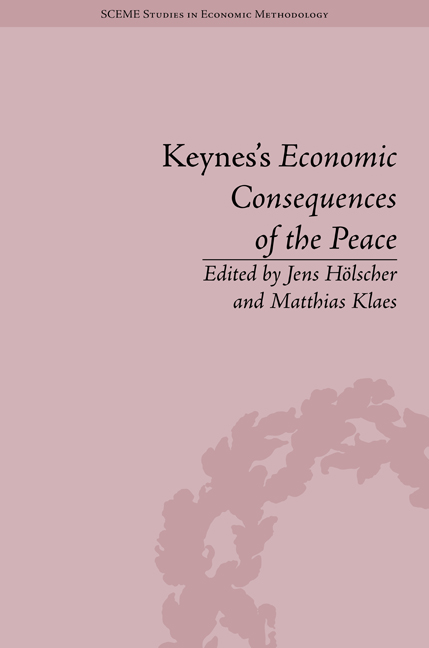Book contents
- Frontmatter
- CONTENTS
- List of Figures
- List of Contributors
- Introduction: Standing the Test of Time: Maynard Keynesas's Economic Consequences of the Peace, a Century On
- Part I The Consequences in their Time
- Part II The Consequences Today
- 5 A Methodological Reading of Economic Consequences of the Peace
- 6 Building New Monetary Institutions in the EMU as a Response to the Financial Crisis: A Keynesian Perspective
- 7 The Economic Consequences of the Euro: Lessons from History
- 8 Keynes and the Economic Consequences of the European Union
- Part III Keynes: A Play
- Notes
- Index
7 - The Economic Consequences of the Euro: Lessons from History
from Part II - The Consequences Today
- Frontmatter
- CONTENTS
- List of Figures
- List of Contributors
- Introduction: Standing the Test of Time: Maynard Keynesas's Economic Consequences of the Peace, a Century On
- Part I The Consequences in their Time
- Part II The Consequences Today
- 5 A Methodological Reading of Economic Consequences of the Peace
- 6 Building New Monetary Institutions in the EMU as a Response to the Financial Crisis: A Keynesian Perspective
- 7 The Economic Consequences of the Euro: Lessons from History
- 8 Keynes and the Economic Consequences of the European Union
- Part III Keynes: A Play
- Notes
- Index
Summary
Keynes's Critique of the Peace Treaty for Today
The gold standard, with unrestricted capital movements, had been the undisputed international norm before 1914. This system broke down during the First World War owing to suspension of the gold redemption in most countries and strict international capital control. Although Keynes was still arguing within the framework of the quantity theory of money and institutions, he was not concerned with the possibility of re-establishing the international gold standard in his critique of the Treaty in Economic Consequences of the Peace.
Keynes's focus point was the prospects for real growth in Europe as a whole. The execution of the war reparations imposed on Germany would, according to Keynes, choke the German economy and by that destabilize the entire European economic region to the disadvantage of all nations, including the victorious ones. To pay the war debt Germany would be forced to create a trade surplus at the expense of its own population, even leading to starvation as the country expanded its exports and reduced imports to obtain the necessary foreign exchange. However, at the same time, a German trade surplus would be harmful to the industries of other European countries. They would experience a fall in output and rising unemployment even though their government might receive war reparations from Germany. The distinctive feature of Keynes's theoretical framework is to see Europe as an economic unity.
- Type
- Chapter
- Information
- Keynes's Economic Consequences of the PeaceA Reappraisal, pp. 129 - 144Publisher: Pickering & ChattoFirst published in: 2014



